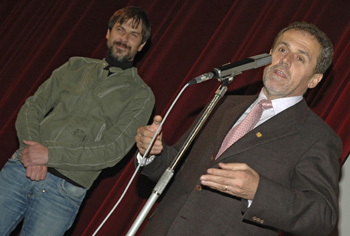|

Boris T. Matic, director of the Zagreb Film Festival
Zagreb Film Festival and the Presidential Elections
By Rada Djurica
Zagreb once more becomes visible on the cultural map of Europe as
the Zagreb Film Festival this year celebrates its fifth anniversary.
This is a small but meaningful anniversary for the influential film
festival that, beside internationally-acclaimed films, features films
from the former Yugoslavian countries, films that usually wouldn't be
seen in Croatia.
Over the past five years, the organizers of the festival have demonstrated
a capacity for bringing first-class films, attracting big crowds to
the screenings. In the spirit of this year's presidential elections
in Croatia, the film festival presented a completely different reality
from the one usually glimpsed in the media. The festival was thus an
escape from the political media war of the presidential elections, as
the film program offered an active political dialogue, potentially improving
the relationship with the other former Yugoslavian country, Serbia,
and serving as a prelude of a new political era in Croatia.
The 2007 Zagreb Film Festival opened with a thriller from Serbia, The
Trap by Srdan Golubovic, and closed with the feature film I'm
Not There by Todd Haynes about Bob Dylan. The fifth anniversary
celebration included feature films, short films, documentary films and
a Croatian film program called Checkers. It lasted for seven days with
seven tracks, presenting over 80 films from 30 countries, with an emphasis
on important from former Yugoslavian countries (which experienced a
bloody civil war in the 1990s).
Boris T. Matic, film producer and director of the Zagreb Film Festival
spoke about the future direction of festival:"Coming next is the
Office for Education, Culture and Sport and City of Zagreb, who have
continuously provided financial support to this common project of ours,
regardless of who takes up which function following the elections and
without intervening in our concept, film selection or anything else,
for that matter. They aren't the political commissaries from the beginning
of the story but partners who recognize the needs of our City and it
Zagreb Film Festival quality that we demonstrate them that they did
the right thing when distributing tax payer's money…"
Croation film director Branko Schmidt spoke about the festival and
his latest project: "I think that Zagreb Film Festival is doing
a great job because it has a good crew, people that know what to do.
This festival now has a good tradition. It is based on the idea to work
well on improvements of the relationship between Croatia and other ex
Yugoslavian countries. That was the idea right from the start. This
is their tendency. As for the elections in Croatia, I don't think that
anything will be changed, not for actors or directors or film production.
This in Croatia works very well. This segment of society (the culture)
is not influenced or dependable by/from the political changes in the
country. But as far as film investing concerns, this will be different
because there will be a Film Center established now. So the Croatian
Ministry of Culture (and government) won't be deciding about financing
of the project, which is much better for film culture because it will
be even less influenced by the current politics. Culture and film will
be even more out of politics and politics have as less possible influence.
Regarding that, my next project is a film called Metastasis,
done by the bestselling novelist Ivo Balenovic, a domestic author, and
is about the narco-mafia in Croatia during the time of Tudjman and civil
war and a young generation without hope, a kind of Croatian Trainspotting."

Boris T. Matic (left) with the mayor of Zagreb, Milan Bandic
|